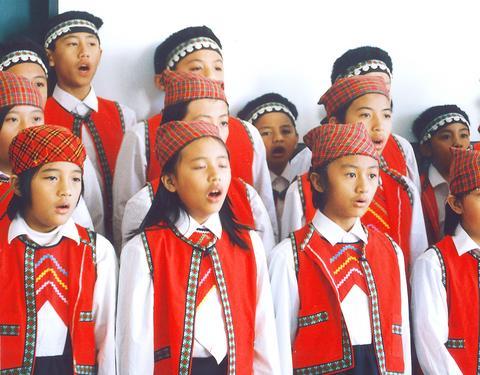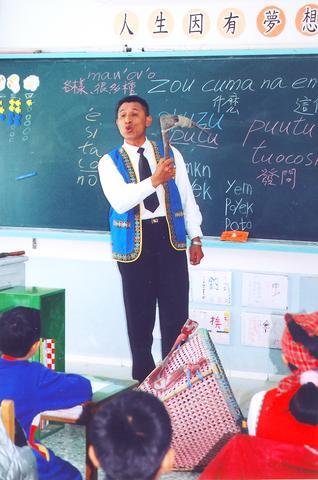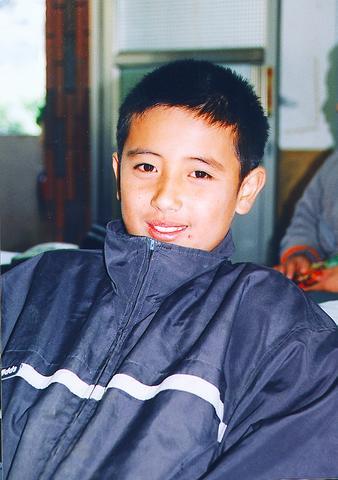The Tsou Aboriginal village of Loyeh (
Loyeh is of no interest to tourists, however. It has no song-and-dance shows for the weekend crowds. No gift shops filled with kitsch novelties or Aboriginal handicrafts. It is where Aboriginal people live, not perform.

PHOTO: MARTIN WILLIAMS, TAIPEI TIMES
Most people would be hard-pressed to have heard of the community.

PHOTO: MARTIN WILLIAMS, TAIPEI TIMES
But at the beginning of Chinese Nationalist Party (KMT) rule in Taiwan, Loyeh played an intriguing historical role.
During the February 28 Incident in 1947, the village was a launching pad for an assault on KMT forces stationed at Chiayi's airport by an Aboriginal unit incensed at the bestial conduct of the new authorities.

PHOTO: MARTIN WILLIAMS, TAIPEI TIMES
For the Tsou tribesmen, that conflict was resolved relatively peacefully. But a few years later, communist agents, attracted by the remoteness of Alishan and the headstrong Aborigines who lived there, targeted the village as one of several potential bases for future military operations against the KMT.
The KMT's security apparatus got wind of the operation and in 1951 seized a cache of weapons, arrested a number of important figures from around the country and eventually tortured and executed six Aborigines in 1954. Four of those killed were from Alishan, and one of these was the alleged ringleader, Tang Shou-jen (
These stories are largely forgotten now, except among a handful of academics and those in the community, who lived under tight surveillance, constant intimidation and strict application of assimilation policies over succeeding decades.
THE SCHOOL
According to newspaper reports of the time, the headquarters of the insurgency, which planned to link up with a communist attack on Taiwan, was the local public school, now called Loyeh Elementary.
It was this same school that the Taipei Times visited during a recent inspection tour hosted by the Ministry of Education.
The ministry was promoting its attempt to stem another form of forgetting -- language death -- which particularly threatens to rob the relatively small, Tsou ethnolinguistic group, no more than 7,000-strong, of its cultural heritage.
Many factors have contributed to the loss of culture, especially language, in Aboriginal communities: Japanese and KMT assimilation policies, initial missionary hostility to and destruction of material culture and "idolatrous" religious practices and so on.
The public school, however, was the primary mechanism for this process. Children in Aboriginal townships were, like their Han counterparts, beaten or humiliated in the classroom if they dared utter native words within earshot of teachers.
But in recent years the government has begun to use the school system to reverse the process.
The school itself is small by national standards, with a main building and additional classrooms surrounding the sports track. But the main building is a pleasing and unusual dark reddish color, evoking the clothing that Tsou men wear during tribal ceremonies. It offers a very different sight from the tile-and-concrete fortresses that pass for educational architecture elsewhere.
The school has 95 students from kindergarten to the sixth grade, a tiny number compared to schools in urban centers, but Loyeh Elementary is still the second-largest school in Alishan Township. Ninety percent of its students are Aboriginal, and its 12 teachers include four Aborigines. The principal, Wu Chih-ming (
In introducing the school, officials were proud to show off the school choir, which sang traditional songs, with piano accompaniment, as well as the unpretentious 14-room teachers' residence at the rear of the school, equipped with a library and connection to the Internet.
THE TEACHER
The Tsou-language class is presided over by Cheng I-chung (
Occasionally he picks up a prop with cultural significance -- a sickle called a tu'u, or a basket carried on the back called a yungku -- and in the best show-and-tell tradition, brandishes it theatrically while explaining its use in the Tsou tongue.
Cheng is one of a new breed of teacher in the public school system. As part of the Democratic Progressive Party's (DPP) new multicultural focus in education, native speakers of languages other than Mandarin of all ages have been fast-tracked into the classrooms, undergoing a few months of pedagogical training and examinations without having to go through years of study at university.
And like his fellow language teacher Wang Hui-en (
THE STUDENT
One of Cheng's students who spoke to the Taipei Times, An Shih-yuan (
For several years he lived in the city -- in Taichung -- expressly because his father "wanted me to be able to compete with my Han [Chinese] classmates there."
But unfortunate family circumstances compelled him to return to Loyeh. And upon his return, the difference between the two classroom environments was very noticeable.
"Up here, they [the classmates] are always yelling at each other," he said, half-jokingly.
And what about learning the Tsou language at school?
"It's fun, but it's kind of embarrassing," he said, alluding to the different levels of ability in the classroom, and the need to learn Romanized script for the language.
And the teacher?
"He's very encouraging and doesn't get fierce with us," Avai said.
"But it's hard to learn the Romanized stuff because it's the same as English. Sometimes it's pronounced differently," he said.
Yet Avai was quite fortunate in that he was able to continue speaking Tsou at home with his family. Not all children at the school have this opportunity, and there are saddening stories from elsewhere of children being unable to communicate with their oldest relatives at all because there was no common language in which to do so.
Avai was enthusiastic about the prospect of studying the Tsou language in high school. The problem for Avai and his like-minded classmates, however, is that, multicultural rhetoric notwithstanding, there is no guarantee there will be a syllabus waiting for them.
THE PROBLEM
The government provides funding for language teaching at all of Alishan Township's elementary schools that have Aboriginal pupils, but, according to Loyeh Elementary's director of teaching and choirmistress, Cheng Pei-chien (
Because of the strongly centralized nature of curriculum content, it seems that the Tsou children have little chance of learning about the role of their own village, their own school and their own people in the modern history of the nation.
The dispiriting implication was that few of these students would be able to build on whatever indigenous cultural base they had acquired in their elementary school years.
Even in the time of a DPP administration, it was clear that teachers at the school were reluctant to bite the hand that feeds them -- to openly lobby their masters for more resources and admit to room for improvement.
One teacher who spoke privately to the Taipei Times, however, said there were several areas that needed more work but which attracted little interest from the county authorities.
One of these was that, for all of the publicity that mother-language teaching was attracting -- not least this media throng from faraway Taipei -- students were still only being taught one lesson per week, a manifestly inadequate amount of time to devote to the subject if the system is serious about preserving indigenous languages.
There are other classes that reinforce language learning -- the school choir sings almost exclusively traditional music and there are audio tapes to listen to, in addition to extracurricular activities.
But the top priority remains Mandarin, with English next in line. And, ironically, Tsou students had recently topped the county in English thanks to the efforts of an Australian man who had married into the community.
That is to say, the children were speaking better English, a language precious few will need to use after leaving school, than their indigenous tongue.
The mother-tongue program seemed more consistent with what Chiayi County Bureau of Education chief Su Te-hsiang (
This, the teacher said, was why the community and the entire Tsou people had to mobilize, to rally together, to make the most of the resources it received.
The teacher suggested that the contribution of families was as crucial to the program as government funding and time allocation and that attempts were being made to encourage parents and guardians to communicate with the children in the Tsou language at home, which was not always an easy task.
And budget realities take their toll. In an almost plaintive tone, bureau chief Su asked a few reporters to do what they could to promote Chiayi County generally, because county revenue was quite limited.
"After you take away the land that is administered by the Yushan National Park Headquarters, the Tourism Bureau, the Taiwan Forestry Bureau, the port authorities and Taisugar, there isn't much left for us to draw revenue from," he said.
When asked for his impressions of the Tsou-language syllabus, Tsan-Der Chou (
"It's OK. There are parts that could be improved," he said, without specifying what those parts were.
THE COMMUNITY
The chairman of Loyeh Elementary's Parents and Teachers Committee is Tang Chih-chieh (
Fifty years after being caught in the middle of the Chinese civil war, the Tang family had reclaimed an influential role at their school and in their community.
The straight-talking, highly traditionalist Tang is also a local liaison officer for Kao Chin Su-mei (
All this creates a sense that there has been a recovery from the fear and violence of the past, a reclaiming of territorial pride.
Speaking on school matters, Tang mentioned a recent exchange program that Loyeh had forged with a school in Taipei City.
"Some kids from Choumei Elementary School (
Soon, a group of Tsou students will embark upon a return visit to the city. Tang agreed that the Tsou children would probably be equally envious of their city counterparts. But to him, the mountain home provides children with something special.
"Living up here in the mountains has its good and bad sides. There is a real lack of resources, and the educational standards are lower. But there is an excellent community spirit, and the environment here is unbeatable for the kids," he said.
THE FUTURE
Many locals hope that one day -- if the practice of a post-election DPP administration can catch up with its rhetoric -- the name of the village can revert to its evocative Tsou name, Lalawuya, or "Maple Grove." The village is also scheduled to become the new administrative center of Alishan Township, replacing the more remote Tapangu Village (
With these changes pending, a sense of optimism, rejuvenation and pragmatism is washing over the community and in the school, despite their disadvantages and the residue of past sorrow, which can surely only benefit the children of Loyeh Elementary, whatever the fate of their mother tongue.
Tang Chih-chieh's father, Tang Chin-hsien (
"It's not about me and it's not about the party," he said.
"It's about doing what you can for the community. It doesn't matter what party you join, as long as you get things done," he said.

Taiwan is stepping up plans to create self-sufficient supply chains for combat drones and increase foreign orders from the US to counter China’s numerical superiority, a defense official said on Saturday. Commenting on condition of anonymity, the official said the nation’s armed forces are in agreement with US Admiral Samuel Paparo’s assessment that Taiwan’s military must be prepared to turn the nation’s waters into a “hellscape” for the Chinese People’s Liberation Army (PLA). Paparo, the commander of the US Indo-Pacific Command, reiterated the concept during a Congressional hearing in Washington on Wednesday. He first coined the term in a security conference last

Prosecutors today declined to say who was questioned regarding alleged forgery on petitions to recall Democratic Progressive Party (DPP) legislators, after Chinese-language media earlier reported that members of the Chinese Nationalist Party (KMT) Youth League were brought in for questioning. The Ministry of Justice Investigation Bureau confirmed that two people had been questioned, but did not disclose any further information about the ongoing investigation. KMT Youth League members Lee Hsiao-liang (李孝亮) and Liu Szu-yin (劉思吟) — who are leading the effort to recall DPP caucus chief executive Rosalia Wu (吳思瑤) and Legislator Wu Pei-yi (吳沛憶) — both posted on Facebook saying: “I

The Ministry of Economic Affairs has fined Taobao NT$1.2 million (US$36,912) for advertisements that exceed its approved business scope, requiring the Chinese e-commerce platform to make corrections in the first half of this year or its license may be revoked. Lawmakers have called for stricter enforcement of Chinese e-commerce platforms and measures to prevent China from laundering its goods through Taiwan in response to US President Donald Trump’s heavy tariffs on China. The Legislative Yuan’s Finance Committee met today to discuss policies to prevent China from dumping goods in Taiwan, inviting government agencies to report. Democratic Progressive Party Legislator Kuo Kuo-wen (郭國文) said

Sung Chien-liang (宋建樑), who led efforts to recall Democratic Progressive Party (DPP) Legislator Lee Kun-cheng (李坤城), was released on bail of NT$80,000 today amid outcry over his decision to wear a Nazi armband to questioning the night before. Sung arrived at the New Taipei District Prosecutors’ Office for questioning in a recall petition forgery case last night wearing a red armband bearing a swastika, carrying a copy of Adolf Hitler’s Mein Kampf and giving a Nazi salute. Sung left the building at 1:15am without the armband and covering the book with his coat. Lee said today that this is a serious